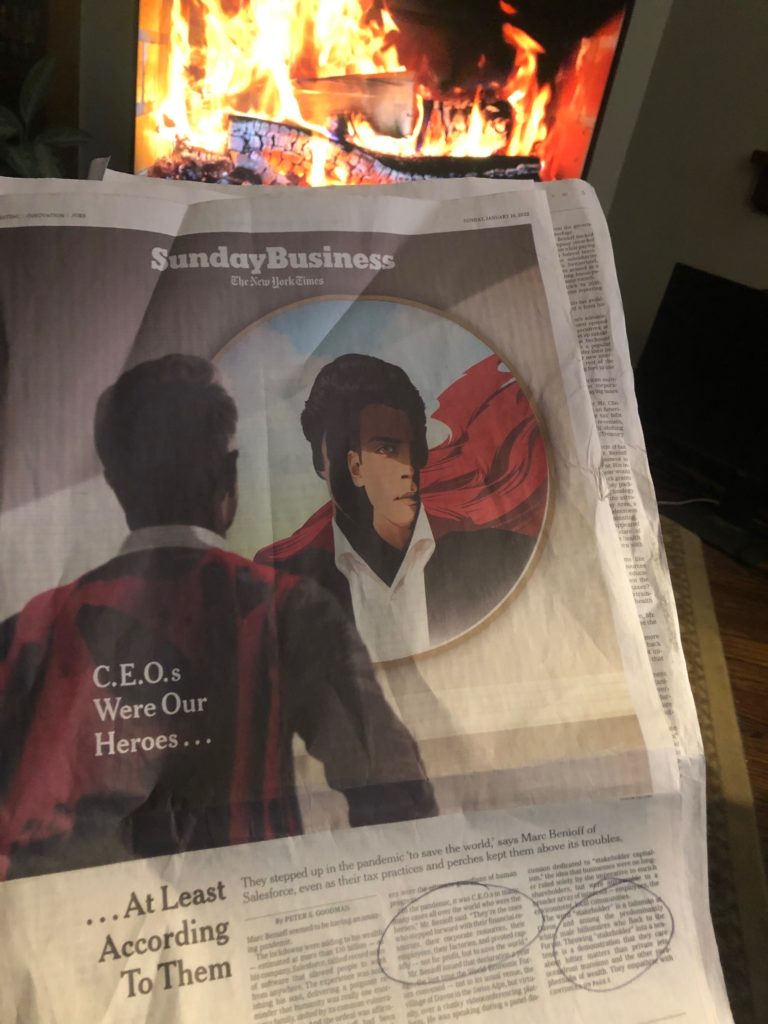Bonfire of the Inanities
January 19, 2022
Corporate CEOs surely don't need me to attack The New York Times' adolescent smear last Sunday. But maybe The New York Times does.
If you didn’t read “CEOs Were Our Heroes … At Least According to Them” on the front page of the business section of Sunday’s New York Times, I understand. Reading the business section of The New York Times is like reading the sports section of Popular Mechanics.
But I read it, and sent it that morning to members of the Executive Communication Council, an organization that my company convenes, comprised of people who create communications for the most prominent CEOs in the world. I wanted to make sure they’d seen this “broadside,” as I described it in my email, as neutrally as I could.
Then I took a couple days to let the piece cool a bit, before deciding whether to write about it.
Why? A few reasons: First, our members don’t need me to defend CEOs; to the extent that CEOs can be the phony, sanctimonious creeps the Times describes, no one knows it better than these people; I’ve heard many stories over many drinks over many years. Second, CEOs themselves don’t need defending from the likes of me.
Still, this piece: Bonfire of inanities!

First off, its premise, that CEOs think they’re civilization’s greatest heroes, is based solely on one speech, delivered by one CEO at a virtual meeting fo the World Economic Forum last year. I’ve been producing a newsletter called the Executive Communication Report that has regularly recorded “what leaders are saying, and how they’re sounding,” since the beginning of COVID, and Benioff’s is the single most self-congratulatory bit of CEO rhetoric I’ve heard in all that time, and there is no second place.
“In this pandemic, it was CEOs in many cases all over the world, who were heroes,” Benioff said. “They’re the ones who stepped forward with their financial resources, their corporate resources their employees, their factories, and pivoted rapidly—not for profit, but to save the world.”
The Times writer, global economics correspondent Peter S. Goodman, uses that as a jumping off point to accuse every CEO who uses the word “stakeholder” to “demonstrate that they care about loftier matters than private jets, oceanfront mansions and other paraphernalia of wealth. … They worry about the vitality of the communities down there, in the shade of their skyscraper headquarters. They prefer that polar bears not succumb to heatstroke and that homeless people be housed somewhere ….” After a few lines like that, I checked, just to make sure Peter Goodman is over the age of 15. He seems to be.
When his adolescent characterizations begin to wear threadbare, Goodman goes back to that same virtual Benioff speech a year ago, and quotes from it again.
“CEOs stepped up,” Benioff said. “We would not be where we are in the world today without the outstanding leadership of many, many CEOs who did heroic work all over the world to basically save their communities.”
Of course, Benioff was speaking to CEOs in that talk; when I have spoken to CEOs’ speechwriters over the last couple of years, I’ve said some pretty generous things, about how they have helped their leaders lead through some of the hardest times of our lives. That’s one of the things you do at conferences, be they of CEOs, speechwriters, or heating and cooling contractors (who kept Americans comfortable during our long weeks and months of lockdown).
Now Goodman is scoffing at Benioff for being “an archetype of a species that has become known as Davos Man, people (mostly men) whose wealth and power are so vast that they are able to write the rules for the rest of us.” Next, Goodman reminds us how well America’s billionaires are doing (which doesn’t correlate 1:1 with corporate CEOs, but fuck rich people, right?). “The beneficiaries have succeeded in sharing little of their gains with the government, a wildly successful mode of tax avoidance that is largely legal. In a triumph of lobbying, the billionaire class has slated the tax code with boondoggles and starved tax collectors of resources.”
And lest the reader begins to groggily draw a distinction between American capitalism and tax policy and the individual human beings who run American corporations, back to Benioff’s old speech we go.
“CEOs are gathering every week to figure out how we can improve the state of the world and get through this pandemic,” Benioff said. “And look against the dysfunction of governments and nongovernmental organizations over the last year. They were not the ones who saved us.”
The main government Benioff was referring to was Trump’s, of course. Clearly, Goodman is running low on outrageous statements from that one speech. And then the piece really gets rich, when Goodman acknowledges that Benioff “is by many indications a true believer. In 2015, when Indiana proceeded with legislation that would have allowed businesses to discriminate against gay, lesbian and transgender employees, he threatened to yank investment, forcing a change in the law. He shamed Facebook and Google for abusing huge public trust and called for regulations on search and social media giants. Early in the pandemic, Salesforce embraced remote work to protect employees.”
Goodman goes on to detail Benioff’s efforts to ease homelessness in San Francisco—and policies he’s implemented encouraging his employees to spend work time philanthropically. And then he writes about his own interactions with Benioff: “I found myself won over by his boyish enthusiasm and his willingness to talk at length absent public relations minders, a rarity for Silicon Valley”—and perhaps Benioff’s main mistake. I don’t know his speechwriter, but I know hundreds of others, none of whom would have written that “CEOs are heroes” stuff, at least without smothering it enough caveats to choke a platitudypus.
The article’s conclusion is one last perfect example of Goodman’s bad form:
The day after Christmas, as many Americans absorbed the alarming rise of Omicron cases while struggling to purchase home COVID test kits, Mr. Benioff tweeted a photo of himself on what appeared to be a sailboat, a tropical island behind him in the blue-green sea. He sported mirrored sunglasses as he grinned triumphantly alongside Lars Ulrich, the drummer for Metallica.
So much for the talk of humanity unbounded. Here was Davos Man reveling in his private domain.
Hit jobs like this are as tasty as eggs Benedict on a Sunday morning. But one must ask, as one wipes one’s beard, “What have I learned here?” In this case, Peter S. Goodman took a couple thousand words in The New York Times to tell his readers that:
• CEOs talk more about poverty and other global problems than actually experience them, firsthand.
• Many CEOs think a lot of themselves. (Many non-CEOs, too.)
• Some of the problems CEOs say they want to solve are connected with the capitalist system which is making them rich.
• CEOs take nice vacations.
Did any reader of The New York Times need to learn that?
Did you?
We tend to shake our heads at the right-wing rube or the arrested-development libertarian or the simple-minded liberal who expresses contempt for “all politicians.” (Gee, fellas, when you throw them all out, who are you going to replace them with? More politicians!)
Well, in a society as economically and culturally tied to the business practices of huge corporations—and in a society as bereft of strong leadership in general—the same should go for people who hate all CEOs.
Which I shouldn’t have to tell the global economics correspondent for a major newspaper.





